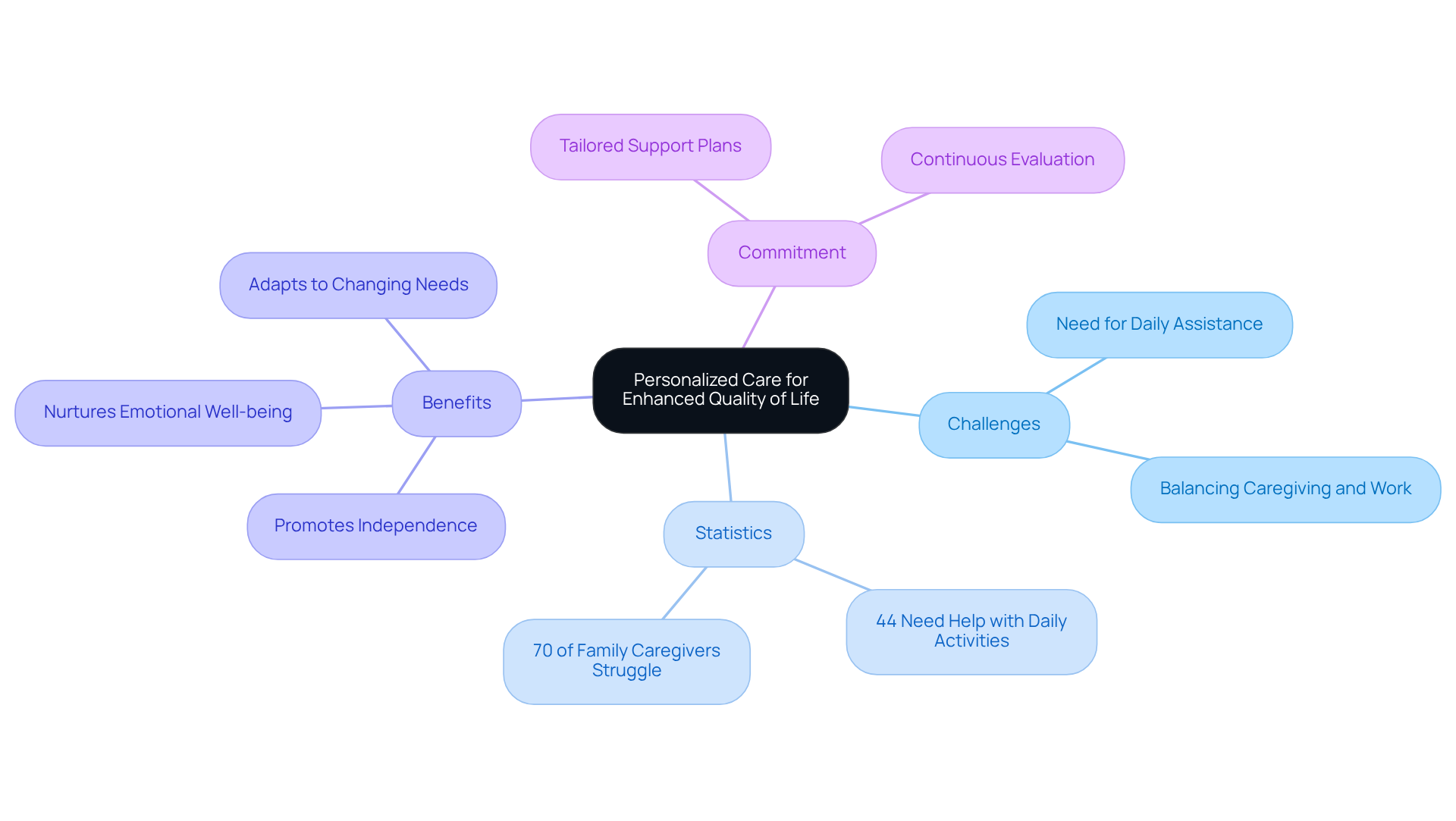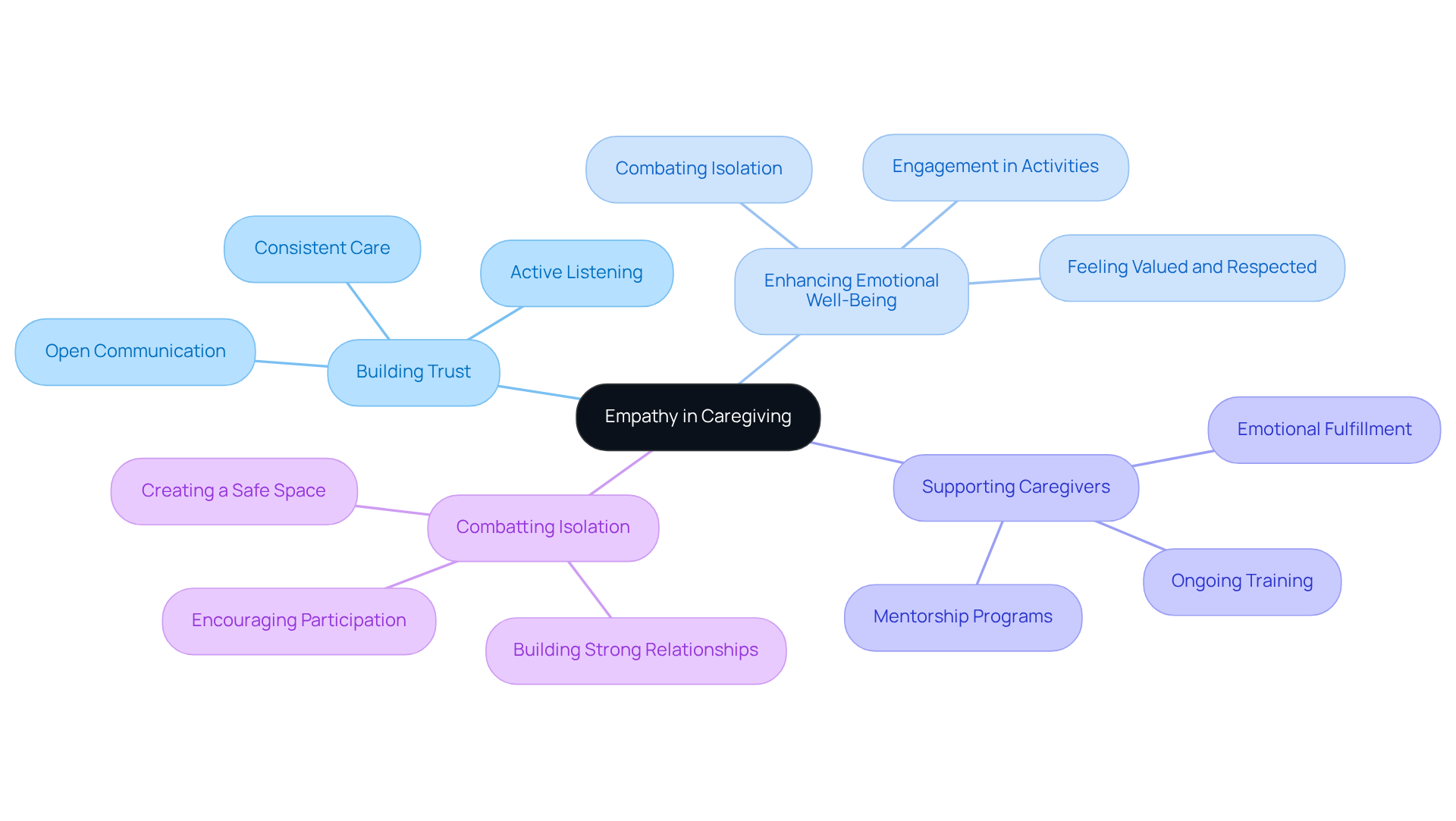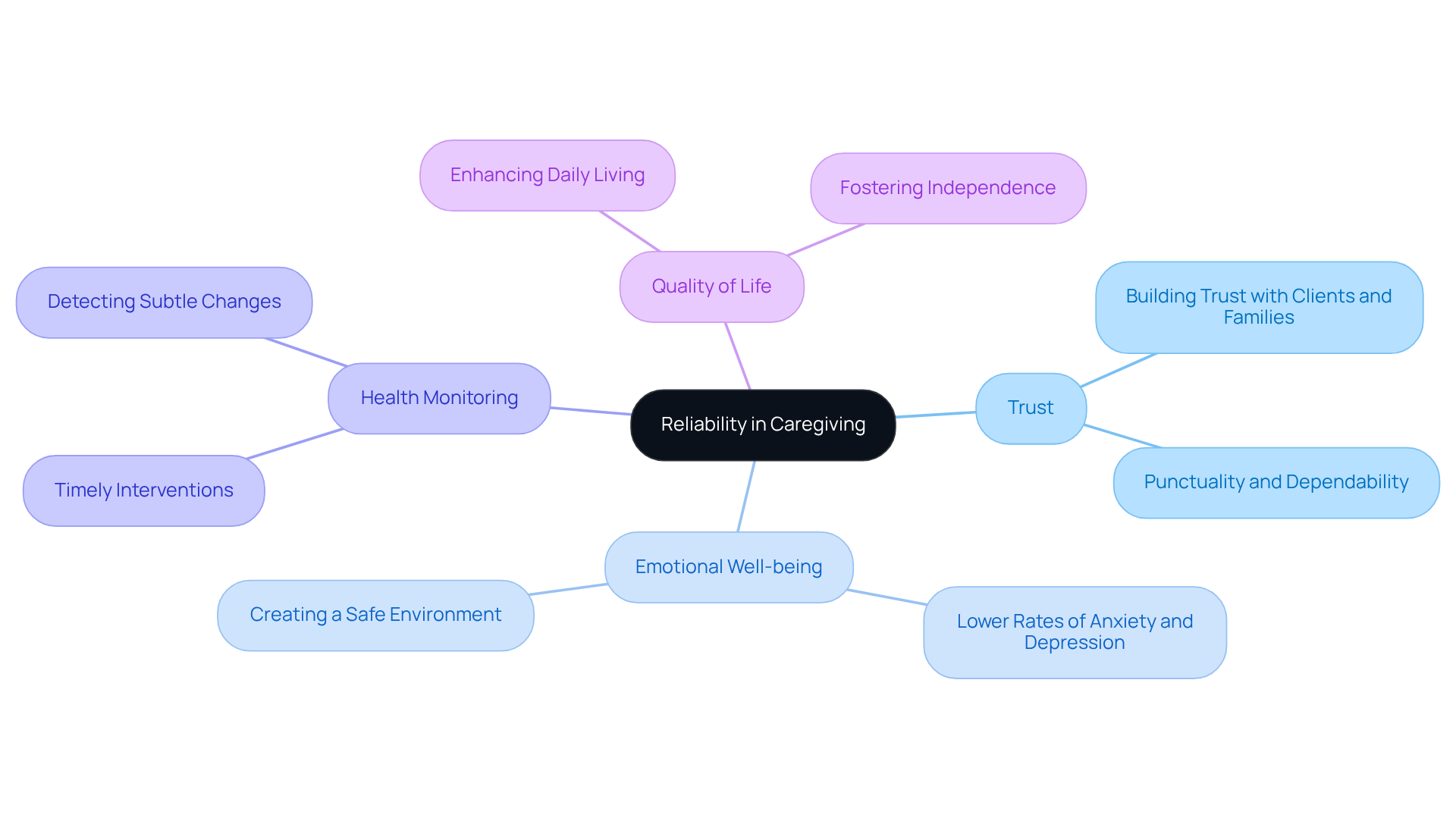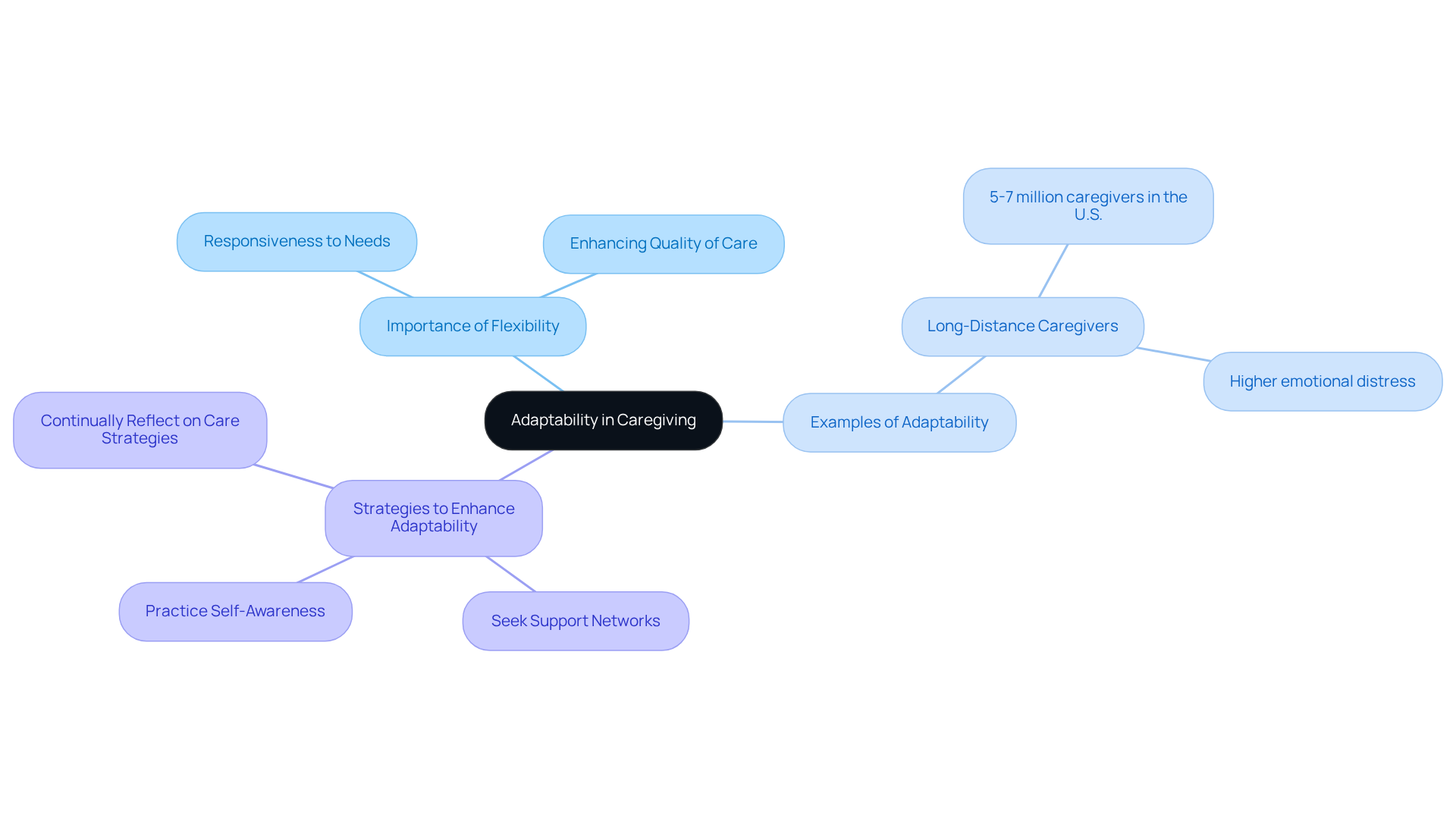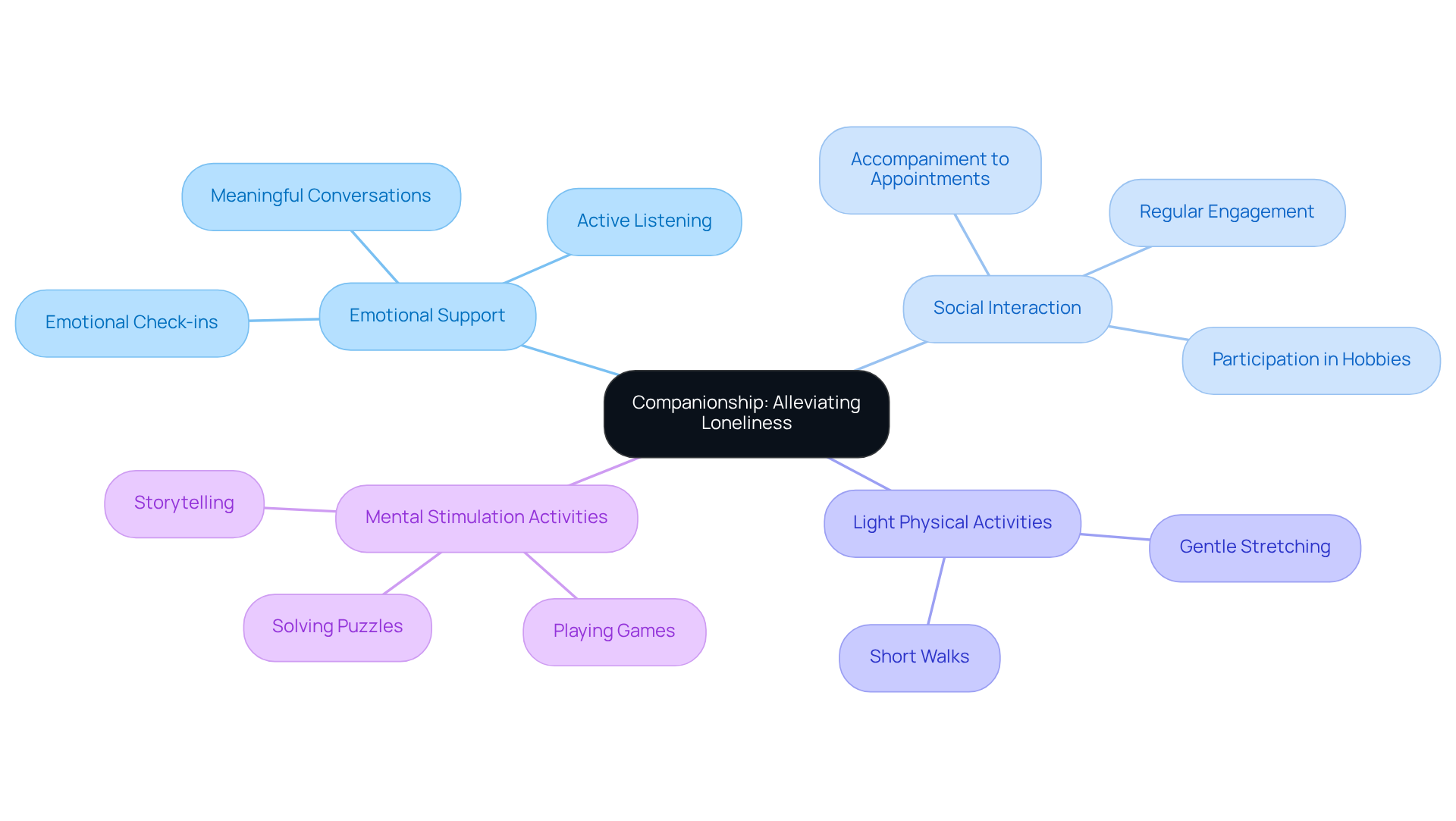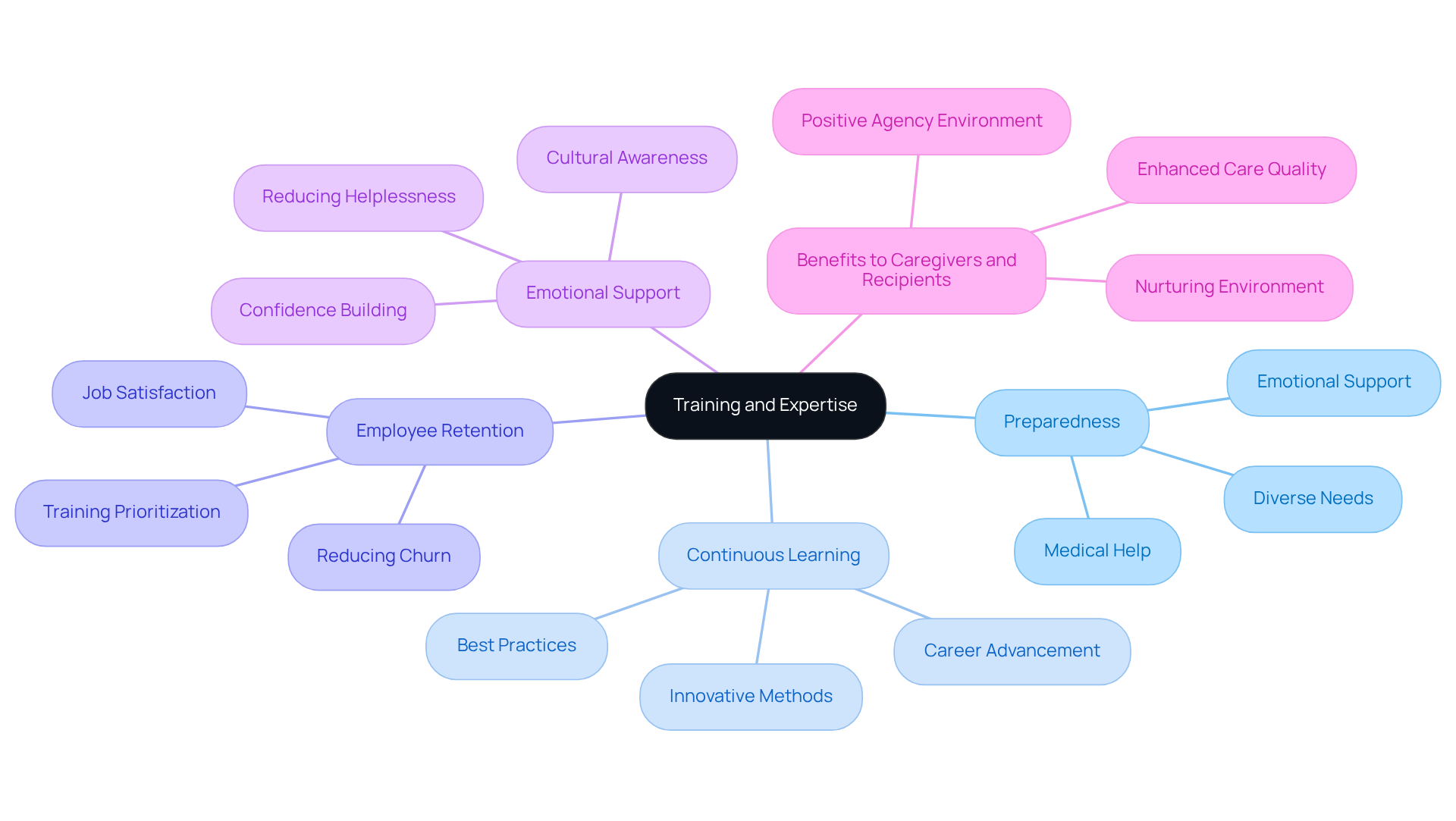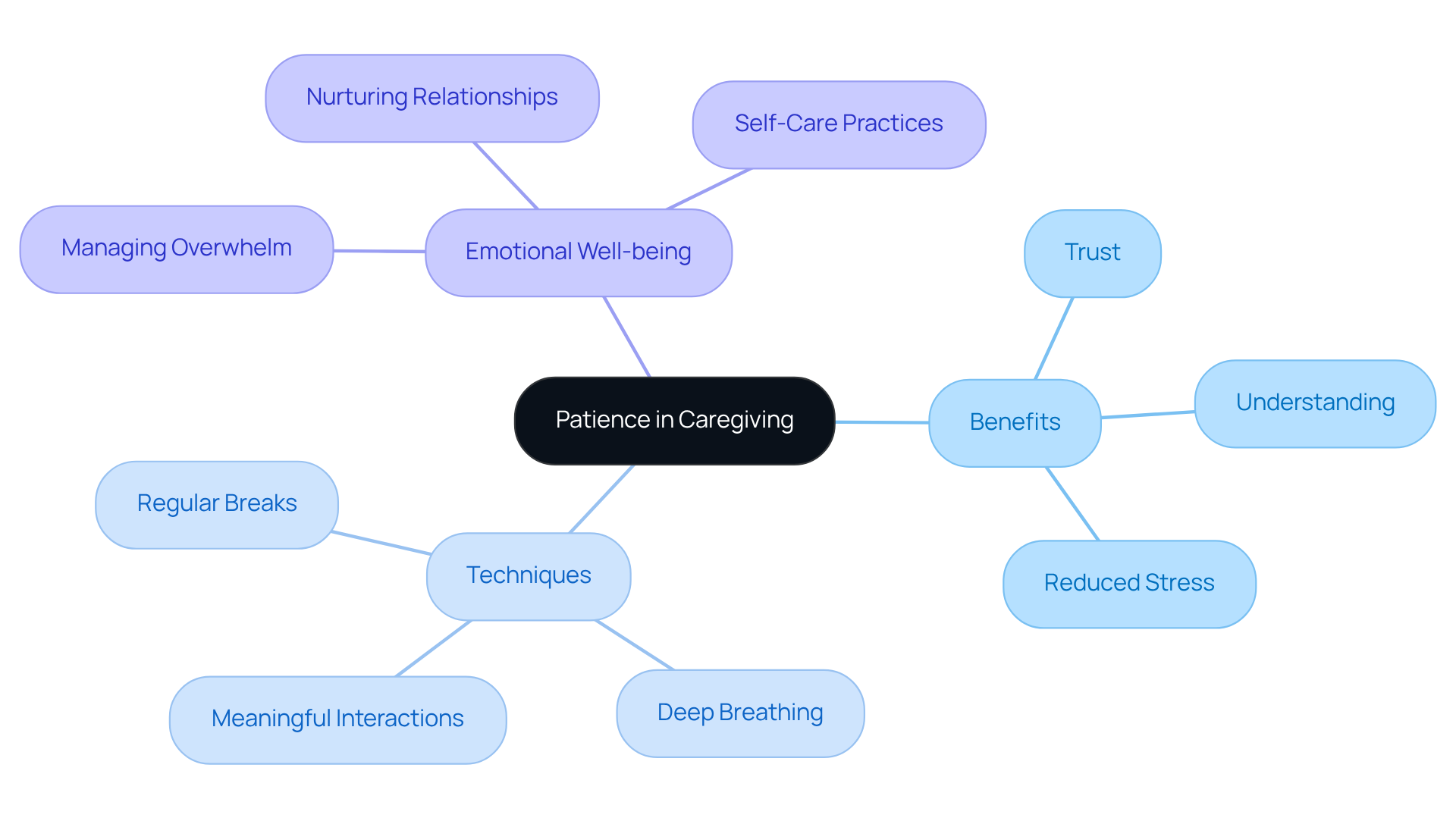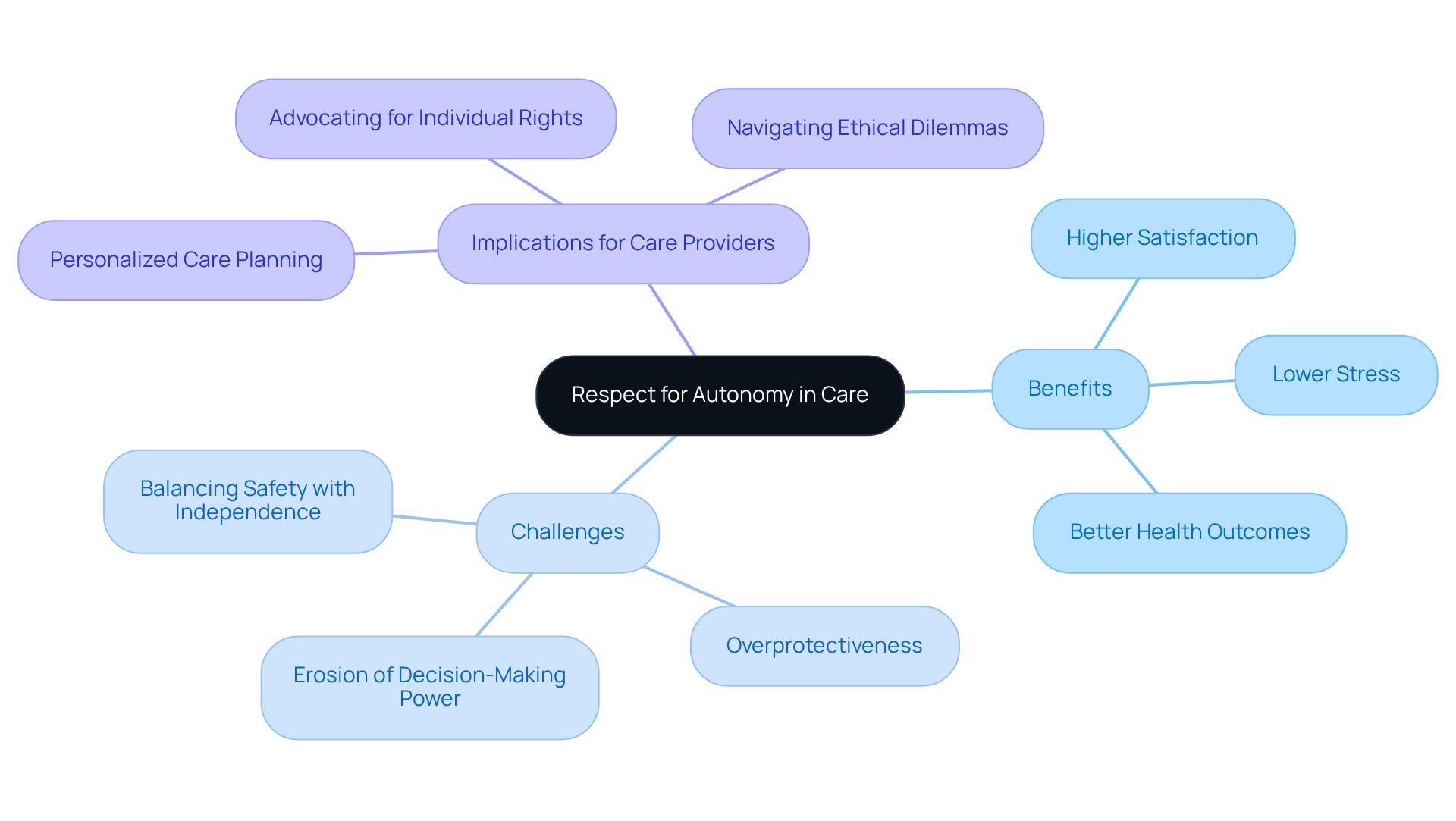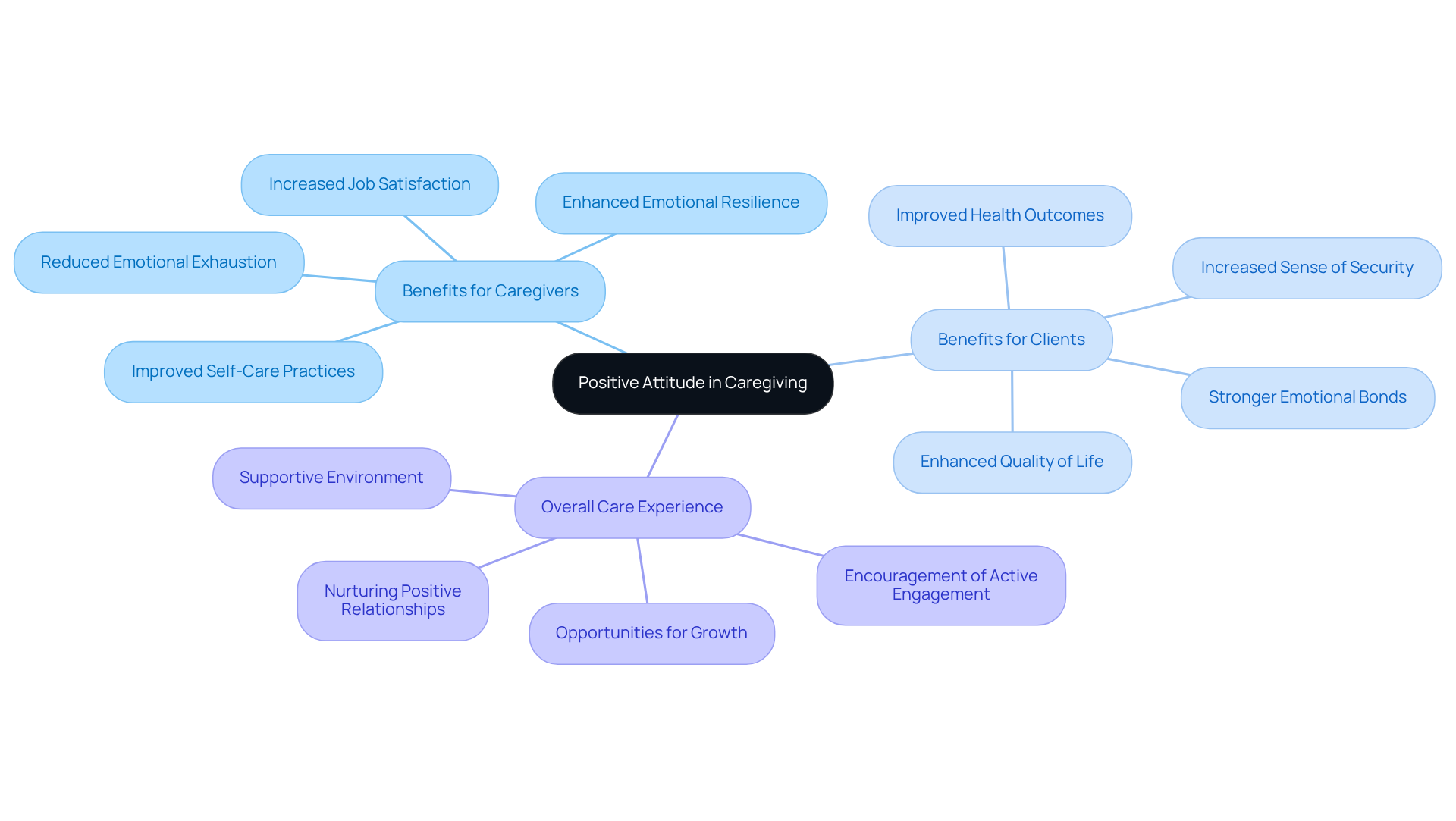Overview
Choosing a private live-in carer for your loved ones can be a deeply emotional decision, often filled with stress and uncertainty. Many caregivers face overwhelming feelings of burnout, struggling to balance their own needs with those of their family members. It’s essential to recognize these challenges and seek support that truly understands them.
A private live-in carer offers personalized care that goes beyond just assistance with daily tasks. This tailored support not only promotes independence but also nurtures emotional well-being. Imagine the peace of mind knowing that your loved one is receiving compassionate care that addresses their specific needs. This kind of support can lead to improved health outcomes and a more fulfilling caregiving experience for everyone involved.
When caregivers feel supported, it creates a ripple effect of positivity. The emotional connection fostered through personalized care can significantly enhance the quality of life for seniors. It’s about more than just physical assistance; it’s about companionship, understanding, and a genuine commitment to their well-being.
Consider the stories of families who have embraced this approach. They often share how the presence of a caring professional has transformed their loved ones’ lives, bringing joy and comfort into their daily routines. These testimonials highlight the profound impact that compassionate care can have, not just on seniors but on their families as well.
In conclusion, choosing a private live-in carer is not just a practical decision; it’s a heartfelt one. It’s about ensuring that your loved ones receive the emotional support they deserve while alleviating some of the burdens you may carry. Remember, you’re not alone in this journey. There are compassionate solutions available that can help you navigate these challenging times with grace and confidence.
Introduction
Choosing the right care for a loved one can feel overwhelming. Families often grapple with the emotional weight of this decision, facing stress and uncertainty about what’s best. A private live-in carer presents a compassionate solution that not only meets immediate needs but also enriches the overall quality of life for seniors and individuals with special needs.
Imagine the comfort of knowing that your loved one is receiving personalized care tailored to their unique needs. This article explores ten compelling reasons why opting for a private live-in carer can be a game-changer. From the profound benefits of individualized attention to the emotional support that fosters trust in caregiving relationships, the advantages are significant.
What challenges might families encounter in this journey? The decision can be daunting, but understanding the right choice can alleviate many concerns. Let’s delve into how a private live-in carer can transform not just the daily routine, but the entire caregiving experience.
Happy to Help Caregiving: Personalized Care for Enhanced Quality of Life
At Happy to Help Caregiving, we truly understand the challenges that come with caregiving. Our mission is to provide tailored in-home assistance from a private live in carer that significantly enhances the quality of life for seniors and individuals with special needs. By prioritizing each person’s unique preferences and needs, our caregivers craft customized support plans. These plans not only promote independence but also nurture emotional well-being, ensuring that clients feel valued and understood in their own homes.
Research shows that personalized assistance can lead to better health outcomes. In fact, studies reveal that:
- 44% of home service recipients need help with at least one daily activity.
- Nearly 70% of family caregivers struggle to balance their careers with caregiving responsibilities.
This highlights the critical need for tailored support and underscores the importance of having a private live in carer to ease stress and anxiety for families.
Customized treatment plans do more than address immediate needs; they are designed to evolve over time. This ensures that as health conditions change, clients receive the appropriate assistance. Our individualized health plans consider all aspects of a senior’s health and lifestyle, which is vital for maintaining their well-being. This proactive approach not only enhances the quality of life for seniors but also fosters a sense of autonomy and dignity, allowing them to thrive in familiar surroundings.
Ultimately, our commitment to personalized support at Happy to Help, including our private live in carer services, transforms the caregiving experience. We strive to be an essential resource for families navigating the complexities of in-home care, providing reassurance and encouragement every step of the way.
Empathy: Building Trust Through Emotional Support
Empathy is essential in caregiving. It lays the groundwork for trust and connection with those we support. Caregivers who show genuine understanding and compassion can significantly enhance the emotional well-being of individuals. By actively listening and responding to feelings, caregivers foster a safe space where people feel empowered to share their needs and concerns.
This approach enriches the support experience and contributes to better overall well-being. Research shows that seniors who feel valued and respected are more likely to engage in daily activities, leading to improved health outcomes and a lower risk of depression. Strong relationships built on empathy can also combat feelings of isolation, promoting a sense of security and comfort.
Emotional support in caregiving is not just beneficial; it can be life-changing, allowing individuals to thrive in their familiar environments. Continuous support and guidance for caregivers are equally important. They help cultivate empathetic skills and ensure caregivers feel valued, which directly impacts the quality of care they provide.
Remember, you’re not alone in this journey. Many caregivers share similar experiences, and together, we can create a nurturing environment that uplifts everyone involved.
Effective Communication: Understanding Client Needs
Effective communication is essential in caregiving. It allows providers to truly understand the unique needs and preferences of those they assist. By fostering open conversations and using positive body language—like nodding and smiling—support providers can show attentiveness and warmth. This approach not only enhances the provider-client relationship but also helps gather vital information that shapes personalized care strategies.
When caregivers actively listen and engage in reflective listening—summarizing and clarifying what individuals say—they build trust and rapport. This connection is crucial for satisfaction. Familiar caregivers, who understand the nuances of those they assist, are often better at noticing subtle changes in health or behavior. This awareness leads to timely interventions, which can make all the difference.
Statistics reveal that familiar caregivers are more likely to catch these changes, highlighting the importance of consistent communication. Ultimately, prioritizing communication enriches the support experience, making it more responsive to individuals’ desires and lifestyles.
Caregivers should strive to create an emotionally secure environment where seniors feel comfortable sharing their thoughts without fear of judgment. This nurturing atmosphere significantly enhances the support relationship, allowing for deeper connections and more effective care.
Reliability: Ensuring Consistent Support for Clients
Dependability in caregiving is so important. It allows individuals to truly rely on their caregivers, knowing they’ll be present and attentive to their needs. When support is consistent, it creates a deep sense of security and stability, especially for seniors who might feel vulnerable. Caregivers who stick to their schedules and keep their promises build trust not just with their clients, but also with their families. This trust ensures that assistance flows smoothly and efficiently.
This reliability is vital. Studies show that seniors who receive consistent care experience lower rates of anxiety and depression, which greatly contributes to their overall well-being. Moreover, familiar caregivers can notice subtle changes in a senior’s condition, enabling timely interventions that can enhance health outcomes. By establishing consistent routines, caregivers help reduce confusion and emotional turmoil, particularly for those with cognitive impairments.
Ultimately, having a reliable supporter can significantly improve the quality of life for seniors, allowing them to thrive in the comfort of their own homes. It’s about creating an environment where they feel safe and cared for, and that makes all the difference.
Adaptability: Responding to Changing Client Needs
Flexibility is an essential skill for caregivers, enabling them to respond effectively to the ever-changing needs of those they support. As situations evolve—whether due to health changes or shifting preferences—caregivers must stay adaptable and resourceful. This responsiveness not only enhances the quality of care but also reassures individuals that their unique needs are prioritized and respected.
For example, studies show that caregivers who adjust their approaches can significantly boost client satisfaction and well-being. In fact, around 5-7 million people in the U.S. are long-distance caregivers, facing unique challenges that underscore the importance of adaptability. By actively listening and adjusting support routines, caregivers create a nurturing environment that fosters autonomy and comfort.
As Susanne White beautifully puts it, “Acceptance is the hardest part, but it’s the queen of effective measures we can take to adjust to change and our new normal.” Embracing adaptability allows caregivers to navigate challenges gracefully, ensuring they meet the distinct demands of each client while upholding a high standard of care.
To enhance their adaptability, caregivers can:
- Practice self-awareness
- Seek out support networks
- Continually reflect on their care strategies
Remember, you’re not alone in this journey; there are resources and communities ready to support you. Together, we can cultivate a compassionate approach to caregiving that truly makes a difference.
Companionship: Alleviating Loneliness Through Connection
Companionship is essential in caregiving, especially for seniors who often grapple with loneliness and isolation. Caregivers who engage clients in meaningful conversations and enjoyable activities can truly make a difference, significantly reducing feelings of loneliness and fostering a sense of connection and belonging.
This emotional support not only enhances the quality of life for seniors but also positively impacts their mental and emotional well-being. Regular social interaction helps seniors feel seen, heard, and valued—crucial elements for their emotional stability and resilience.
Encouraging light physical activities, like short walks or gentle stretching, can further promote physical health and release those mood-boosting endorphins, combating the lethargy often linked to loneliness. Activities such as:
- storytelling
- playing games
- solving puzzles
provide vital mental stimulation, helping to preserve memory and improve focus.
Ultimately, the compassionate presence of a private live-in carer nurtures a supportive environment where seniors can thrive. This reinforces the importance of social connections in their daily lives. As noted by the National Institute of Health, “people who engage in meaningful social connections have a more positive outlook on life, make better health choices, improve their cognitive function, and feel a stronger sense of purpose.
Training and Expertise: Ensuring High-Quality Care
Training and expertise are vital for providing high-quality support. Caregivers who undergo thorough training feel more prepared to meet the diverse needs of those they assist, whether it’s medical help or emotional support. Continuous learning not only keeps providers updated on best practices and innovative methods but also enhances the overall support experience for individuals.
It’s important to recognize the emotional challenges caregivers face. Research shows that over 40% of agencies prioritize training and development to boost employee retention. This highlights how crucial continuous learning is for maintaining a stable workforce. Moreover, structured training initiatives that emphasize cultural awareness and emotional support can significantly reduce feelings of helplessness among caregivers, fostering a more confident and skilled workforce.
By prioritizing continuous learning, support organizations can ensure their staff are equipped with the necessary skills to offer exceptional, personalized assistance. This commitment ultimately benefits both providers and recipients alike, creating a nurturing environment where everyone can thrive.
Patience: Managing Challenges with Grace
Patience is a truly invaluable quality for those providing care. It helps navigate the complexities of caregiving with grace. When faced with a person’s frustration or unexpected changes, caregivers who show patience can create a soothing atmosphere that encourages trust and understanding. This approach not only benefits the person receiving care but also helps caregivers manage their own stress and emotional well-being.
Experts recommend that caregivers take regular breaks to recharge. This simple practice can significantly reduce feelings of guilt and resentment that often accompany caregiving duties. By prioritizing patience and incorporating easy techniques like deep breathing, caregivers can nurture meaningful interactions. These moments strengthen their relationships with those they assist, leading to a more supportive and harmonious caregiving experience.
Remember, it’s okay to feel overwhelmed at times. You’re not alone in this journey. Embracing patience and self-care can transform your caregiving experience into one filled with compassion and connection.
Respect for Autonomy: Supporting Independence in Care
Honoring a patient’s independence is essential for providing dignified support. It’s important for supporters to actively encourage individuals to make decisions about their daily activities and preferences. This not only promotes a sense of independence but also uplifts their self-worth and enhances their overall happiness with the support they receive.
Studies reveal that older adults who engage in care-related decisions report higher satisfaction, lower stress, and even better health outcomes. When individuals are allowed to express their preferences, support providers can create a more personalized experience that aligns with their values and lifestyle. This ultimately leads to improved mental and physical well-being.
Autonomy is about having the freedom to make choices regarding how, with whom, when, and where to spend one’s time. However, care providers face the delicate task of balancing the promotion of autonomy with the need for safety, which is crucial in elderly support.
By fostering this balance, we can ensure that care is not just about meeting needs but also about nurturing the spirit of independence that every individual deserves.
Positive Attitude: Enhancing the Care Experience
A positive mindset is crucial in caregiving, uplifting both patients and caregivers. When providers embrace optimism and enthusiasm, they create a more enjoyable and supportive atmosphere. This not only enhances the overall assistance experience but also encourages individuals to engage more actively in their treatment. As a result, they often see improved health outcomes and a better quality of life.
Research indicates that caregivers with a positive outlook experience less emotional exhaustion and find their caregiving roles more rewarding. Clients who perceive their support providers as optimistic tend to feel more secure and content, which strengthens the emotional bonds essential for effective care. As Village Caregiving highlights, “Keeping a positive attitude is important for everyone, but it’s especially beneficial for older adults and their mental, emotional and physical health.”
By nurturing a culture of positivity, caregivers can turn challenges into opportunities for growth, benefiting both themselves and those they assist. To maintain this uplifting perspective, caregivers are encouraged to practice gratitude and mindfulness, which can significantly enhance their caregiving experience. Remember, fostering a positive environment not only helps those in your care but also enriches your own journey as a caregiver.
Conclusion
Choosing a private live-in carer for a loved one can truly transform their quality of life. It ensures they receive personalized, compassionate, and reliable support tailored to their unique needs. This approach not only fosters independence but also enhances emotional well-being, allowing seniors to thrive in the comfort of their own homes.
Throughout this discussion, we’ve explored various compelling reasons that highlight the advantages of private live-in care. From the importance of empathy and effective communication to the necessity of reliability and adaptability, each aspect plays a crucial role in creating a nurturing environment. The insights shared underscore how companionship, training, patience, and respect for autonomy contribute to a holistic caregiving experience that prioritizes the individual’s dignity and happiness.
Ultimately, embracing the benefits of private live-in care is a meaningful step toward improving the lives of seniors and their families. By recognizing the significance of personalized support and the value of emotional connections, caregivers can create a positive atmosphere that uplifts everyone involved. It’s essential to prioritize these elements in caregiving, as they not only enhance the care experience but also promote a sense of belonging and security for those who need it most.
Frequently Asked Questions
What is the mission of Happy to Help Caregiving?
The mission of Happy to Help Caregiving is to provide tailored in-home assistance from private live-in carers to enhance the quality of life for seniors and individuals with special needs by prioritizing their unique preferences and needs.
How does personalized care benefit clients?
Personalized care promotes independence, nurtures emotional well-being, and ensures that clients feel valued and understood in their own homes, leading to better health outcomes.
What statistics highlight the need for personalized caregiving support?
Research shows that 44% of home service recipients need help with at least one daily activity, and nearly 70% of family caregivers struggle to balance their careers with caregiving responsibilities.
How do customized treatment plans work at Happy to Help Caregiving?
Customized treatment plans are designed to evolve over time to address changing health conditions, ensuring clients receive appropriate assistance while considering all aspects of their health and lifestyle.
What role does empathy play in caregiving?
Empathy builds trust and connection, enhancing the emotional well-being of individuals. Caregivers who show understanding and compassion create a safe space for clients to share their needs and concerns.
How does emotional support impact seniors?
Emotional support can lead to improved health outcomes, a lower risk of depression, and increased engagement in daily activities, contributing to a sense of security and comfort.
Why is effective communication important in caregiving?
Effective communication allows caregivers to understand the unique needs and preferences of clients, fostering open conversations that enhance the provider-client relationship and inform personalized care strategies.
What is the significance of familiar caregivers in the caregiving process?
Familiar caregivers are better at noticing subtle changes in health or behavior, which leads to timely interventions and a more responsive care experience.
How can caregivers create a nurturing environment for seniors?
Caregivers can create a nurturing environment by fostering emotional security, encouraging seniors to share their thoughts without fear of judgment, and building deeper connections through effective communication.


